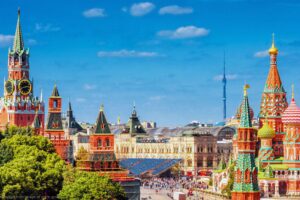RUSSIALINK: “6 Ideas to Explore – Russia Analytical Report, Sept. 19-26, 2022” – Russia Matters

(Russia Matters – russiamatters.org – Sept. 26, 2022)
1. Vladimir Putin’s public threat to use nuclear weapons in Ukraine must be received soberly if only because leaders occasionally do what they say they’ll do, according to Peggy Noonan. “American diplomats have believed Mr. Putin will never use tactical nukes because he’d fear the price. But they can’t know that, especially if they’re unclear what price they’d exact,” Noonan warns. For Putin, “the whole meaning of his adult life is his war with the West, and [Ukraine] is the battlefield,” according to this WSJ columnist.
2. Western powers should fear a nuclear exchange over Ukraine, according to Russian strategist Dmitri Trenin. Many people in the West are no longer afraid of a nuclear war, even though they should be, given the war in Ukraine, according to Trenin. Re-instilling this fear of the “next step” in the Americans is the only way Russia can stop the U.S., Trenin claimed in a TV interview with the head of Russia’s Council on Foreign and Defense Policy, Fyodor Lukyanov. “The main thing here … is to turn [Russian] nuclear weapons into an effective element of deterrence … in order to convince the United States that a strike will follow on the U.S. territory as well,” according to the former head of the now defunct Carnegie Moscow Center.
3. There is a growing chance that Putin will use nuclear weapons and Joe Biden needs to emulate JFK’s dual-track approach toward resolving the Cuban Missile Crisis, according to David Ignatius. Kennedy succeeded in the CMC because he showed that he was prepared to risk nuclear war to stop a reckless move by Moscow while finding a face-saving way, through a secret back channel, to avoid the ultimate catastrophe, Ignatius writes in WP.
4. A Russian nuclear strike against Ukraine “would be unlikely to spark a retaliation in kind” by any of Ukraine’s nuclear-armed allies. However, it could trigger conventional military responses from Western states to punish Russia, according to Western officials interviewed by FT.
5. Putin’s mobilization is meant to protract the conflict beyond 2023 rather than to overwhelm Ukrainian forces, in hopes that the West will force Ukraine to negotiate. That is the view of RUSI’s Jack Watling, who thinks Western allies of Ukraine should respond to Putin’s decision to order a “partial” mobilization by expanding the training and arming of the Ukrainian army.
6. Putin’s failure to address Russians’ “concerns and fears” with regard to his war in Ukraine is eroding his leadership, according to Tatiana Stanovaya. “The current political demand is for a decisive, bold, well-informed and competent strongman—and for Putin these latter two attributes are currently in doubt,” Stanovaya writes for Carnegie Endowment. Marlene Laruelle concurs with Stanovaya that Putin is in trouble, warning that the war in Ukraine may make “the ground beneath his feet … shift.”
